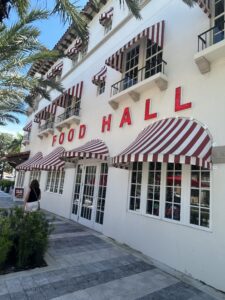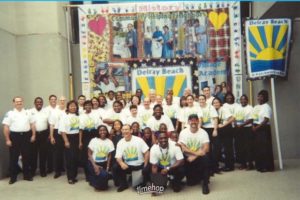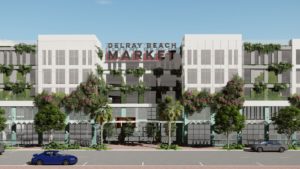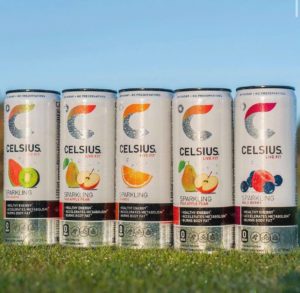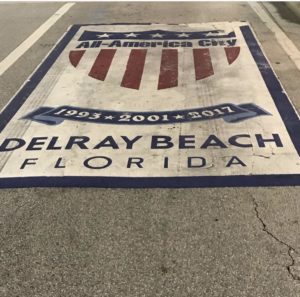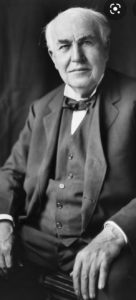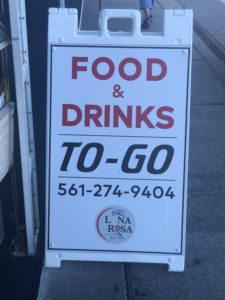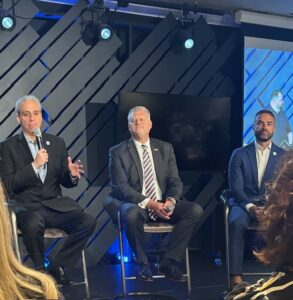
From left, Mayor Singer, Boca Chamber President Troy McClellan and Councilman Andy Thomson.
Last week, I wrote about some of the amazing things happening in West Palm Beach.
I touched briefly on Boca Raton, but I realized that there is more to talk about when it comes to Boca.
It’s funny, when you’ve been the mayor of a neighboring city, people get antsy when you say something nice about another community. One time– way past my “sell by” date— I rode on a float with the Mayor of Lake Worth Beach in the Delray holiday parade.
On the float, I was given a t-shirt touting Lake Worth. It read something like this: “Lake Worth, Making Delray Nervous for 100 years.” I thought the message was cute and complimentary of Delray because it hints that our town is an ideal that others strive to match.
But apparently I hit a nerve and a local gadfly went after me on Facebook as if I defected to Cuba and declared my love for communism. Oh well…
As they say in NY…tough noogies. I like Lake Worth Beach. Always have, always will.
Anyway, Boca has been a friendly rival of Delray for years—with the emphasis on friendly.
Way back when, I debated then Boca Mayor Steven Abrams about the merits of both cities. We squared off in the atrium of a Boca office building and had a great time. The Boca News (rest in peace) even put us on the cover in boxing gear.
It’s always good when we can approach life with a sense of humor. National politicians should take note: just like Boca and Delray aren’t enemies, Americans shouldn’t be at war with each other either.
But let’s avoid the national mess and revisit Boca Raton, which is nearing its 100th birthday as a city in 2025.
I had the pleasure of attending a half-day CityLead leadership conference recently at Boca Raton Community Church. CityLead is a monthly event that attracts a wide variety of local leaders. Pastor Bill Mitchell has been leading this effort for a decade and it’s wonderful. Check it out, I promise you won’t regret it: https://citylead.com/boca/
Once a year, they do a half-day conference and I was finally able to attend as a guest of 4Kids of South Florida, a wonderful nonprofit that partners with the Carl Angus DeSantis Foundation.
It was a great day with lots of highlights and lots of takeaways that I’m still processing.
But one segment I got right away.
It was a 15-minute panel featuring Boca Raton Mayor Scott Singer, City Councilman Andy Thomson and Boca Chamber CEO Troy McClellan.
In that short period of time, these three civic leaders touted why they love Boca Raton. They talked about the city’s business development efforts (39 publicly traded companies call Boca home), the quality of life, the fact that young people are flocking to the city for jobs (the median age of Boca is getting younger and is now 47) and how the city seems to have “aspiration” in its DNA. From Addison Mizner’s dream, to the brave soldiers who once called Boca home during World War II, from the IBM era to today’s thriving economy Boca Raton has it going on and these leaders were beaming with civic pride.
But they talked about the “soft stuff” too. Councilman Thomson spoke passionately about an effort to promote neighborliness and how he plans to work with homeowner associations and community organizations to encourage people to check in with their neighbors. Mayor Singer talked about the people who come to Boca and find ways to serve and engage. My friend Troy talked about community institutions such as the 75-year-old chamber, trusted nonprofits like the George Snow Scholarship Fund and the fact that even with 103,000 people Boca still feels like a community.
Pastor Mitchell noted that the speakers filled the air with positivity about Boca and never talked about the wonderful beaches, beautiful parks and A-rated schools. In other words, Boca has lots of good stuff.
I felt the civic pride and during a break I caught up with Mayor Singer. He was approached by several people who expressed their love of Boca, including one young woman who graduated from Boca High, went to the University of Florida and came home to work in advertising. She told the mayor she wanted to be the next generation of leadership in the city.
That short conversation captured everything—the holy grail of community building. You want young people to feel excited about their hometown. You want people to fall in love with a place and dedicate themselves to making it better.
Troy, Andy, Scott and Bill Mitchell all mentioned being stewards of their special city. They showed respect to past leaders who built an awesome place, and they saw their roles as making their city better.
Now I’m sure some don’t like growth; others can’t stand the traffic and still others lament the changes that have occurred. No place is perfect, and no place is perfect for everyone. But cities are not museums, they change, they evolve and if you work hard and are intentional they change for the better. But some things should never change: respect for the past, nurturing a sense of community, caring for others and creating opportunity for future generations.
What I saw at CityLead and what I know from watching and doing business in Boca for a long time is that it’s a strong city with lots of valuable assets and anchors. All those anchors and assets matter—the universities, the businesses, the parks, the beach, the schools, the nonprofits and the places of worship—but the most valuable resource is always the people who call a place home.
People provide leadership, pride of place and aspiration.
Boca has it. And they appreciate what they have.
Mercury Morris
Dolphins great Mercury Morris died over the weekend at the age of 77.
Mr. Morris was a talented running back who won two Super Bowls with the Dolphins in the 70s and was on the team that had the “perfect season.”
Post football he had some legal issues that were eventually tossed and he became a well-traveled public speaker. As a rookie journalist in Binghamton N.Y. in the mid 80s, I had a chance to interview Mr. Morris when he visited Broome County Community College. He was my first “celebrity” interview and I was really nervous to meet him. In short order, I had a chance to meet and interview MASH actor Mike Farrell and Watergate figure G. Gordon Liddy. Farrell was wonderful, Liddy was… let’s say… colorful. But Mercury Morris helped to put these interviews in perspective for me. I remember him as being kind, intelligent and determined to share his story with young people.
I am a football fan so that was common ground and I got to ask him about the famed back field he was part of alongside Jim Kiick and Larry Csonka.
I still have the “clip” from that interview and I used the piece as part of my collection of clips to apply for jobs in South Florida. I liked how the interview turned out and I figured that editors would me more interested in the NFL than my stories about whether there should be a solid waste facility in Vestal, N.Y. or rural Conklin.
Rest well Mercury and thanks for the memories. What a football player. He was electric.
